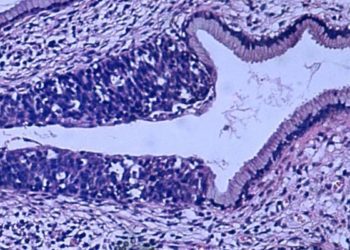Adding bevacizumab may not improve breast cancer survival
1. In a phase III trial of over 370 patients with advanced breast cancer, the addition of anti-vascular endothelial growth factor (VEGF) agent bevacizumab to endocrine therapy (ET) for breast cancer did not significantly increase progression free or overall survival compared to ET alone.
Evidence Rating Level: 1 (Excellent)
Study Rundown: In patients with hormone-receptor positive breast cancer, adjuvant endocrine therapy (ET) with an aromatase inhibitor such as letrozole has demonstrated improved overall survival. However, resistance to ET may develop over time which limits the treatment options for these patients. ET resistance is hypothesized to be mediated by neoangiogenesis, particularly the overexpression of vascular endothelial growth factor (VEGF) within breast cancer cells. Thus, the purpose of this trial was to evaluate the effect of the addition of bevacizumab, a VEGF-inhibitor to ET. The Phase III trial randomized over 370 hormone positive, HER2-negative breast cancer patients to ET alone or ET plus bevacizumab. After a median follow-up of 23 months, patients in the ET plus bevacizumab arm did not demonstrate significant improvement in progression free survival, time to treatment failure, or overall survival compared to ET alone. Significant adverse events, such as thromboembolic events and hypertension, were also higher in the ET plus bevacizumab group. The results of this trial oppose the addition of bevacizumab in patients with hormone receptor-positive/HER-2 negative advanced breast cancer. The strength of the trial is the randomized design and the a priori requirement of treatment success. This trial is applicable to the specific patient population of patients with hormone-receptor positive advanced breast cancer; additional trials are required to evaluate the effect of bevacizumab in patients with hormone receptor-positive metastatic breast cancer.
Click to read the study in JCO
Relevant Reading: Vascular endothelial growth factor is associated with the efficacy of endocrine therapy in patients with advanced breast carcinoma
In-Depth [randomized controlled trial]: The Letrozole/Fulvestrant and Avastin (LEA) study was a phase III, multicenter, open-labelled trial from Spain and Germany to analyze the effect of adding bevacizumab to ET in patients with hormone receptor-positive/HER2 negative breast cancer. Overall, 374 breast cancer patients were recruited from 2007 to 2011 and randomized to either ET (letrozole or fulvestrant) alone or ET with bevacizumab. Exclusion criteria included prior treatment for metastatic disease, prior treatment with anti-VEGF agents, and rapidly progressive disease or poor performance status. The primary end point was progression-free survival (PFS); secondary endpoints included overall survival (OS), time to treatment failure (TTF), overall response rate (ORR), clinical benefit rate (CBR), and response duration (RD). After a median follow-up time was 23.7 months. Median PFS was 19.3 months (95%CI 16.5-22.1) in the combined treatment arm and 14.4 months (95%CI 11.4-17.5) in the ET-only arm (p = 0.125). OS for the two arms was 52.1 and 51.8 months, respectively (HR 0.87; 95%CI 0.58-1.32; p = 0.518). There was a significantly increased incidence of grade 3 to 4 adverse events in the ET plus bevacizumab arm including hypertension, aminotransferatse elevation, and proteinuria. Eight patients (4.2%) in the combination arm died within 30 days of end of treatment. There were no toxicity-related deaths in the ET alone arm.
Image: PD
©2015 2 Minute Medicine, Inc. All rights reserved. No works may be reproduced without expressed written consent from 2 Minute Medicine, Inc. Inquire about licensing here. No article should be construed as medical advice and is not intended as such by the authors or by 2 Minute Medicine, Inc.







